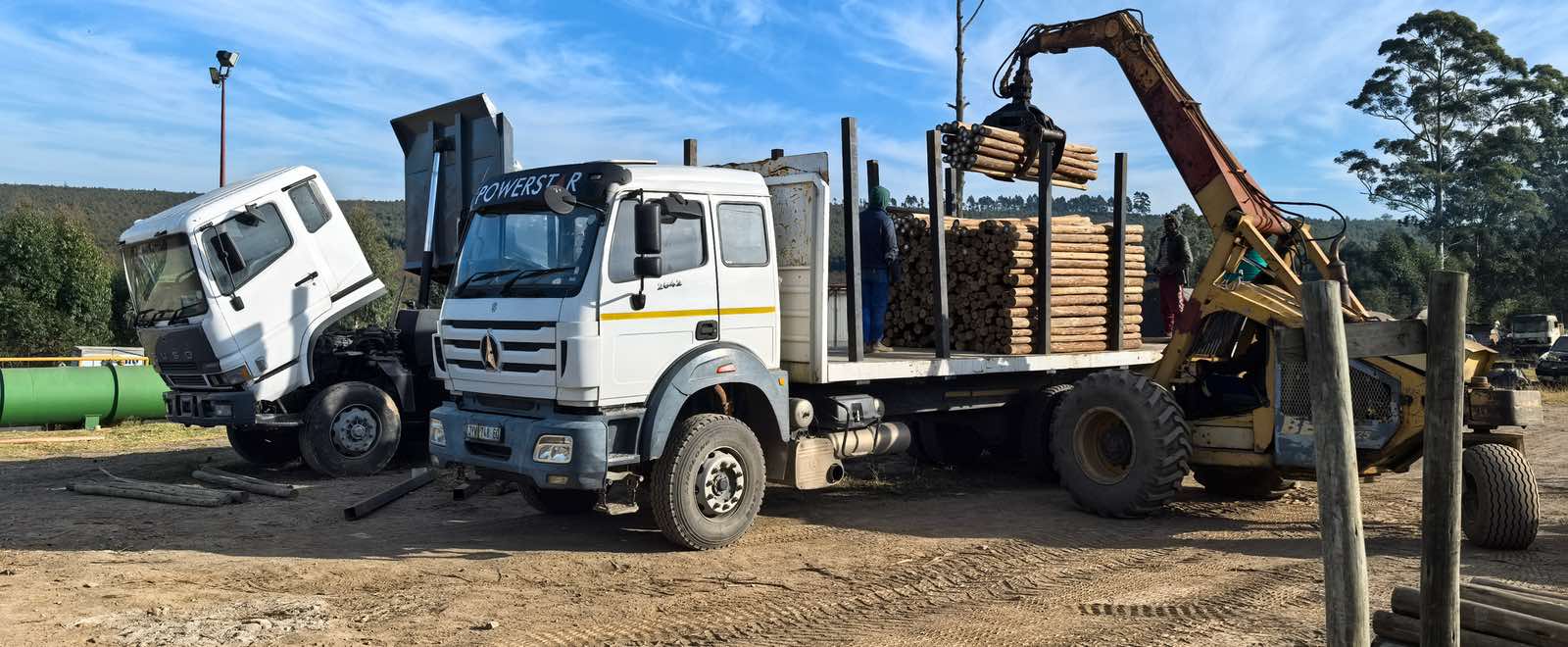How Eastern Cape Entrepreneur Saved His Family’s Timber Business
Caption:
Fencing poles being loaded into trucks at a timber treatment plant in Flagstaff, Eastern Cape
📷 SUPPLIED
Deep in the rural Eastern Cape, Sivuyise Sotshongaye is spearheading the revival of his family’s timber business after it closed its doors in 2017 due to damaged infrastructure.
But nearly a decade after Sotsho Treated Timbers (STT) went bust, the company has been nursed back to health, thanks to Sivuyise’s heroic efforts, determination, and never-say-die attitude.
This is a remarkable feat considering that only one-third of family businesses are successfully handed over to the next generation, which means that nearly 70% of family businesses do not survive beyond their founders.
By resurrecting STT from the dead, Sivuyise has ensured that his father’s legacy is not lost. The 31-year-old native of Flagstaff -- a rural town near the border between Eastern Cape and KwaZulu-Natal provinces -- inherited the business from his father, Zolile, who established it in 1990 after winning an open-bid tender from the then-Transkei government.
Zolile started STT as a poles business supplying creosote-treated poles to hardware stores. But as years went by, the company began experiencing a sharp decline in sales as more customers switched from creosote-treated poles to copper-chrome arsenate (CCA) treated poles, which are used for fencing, landscaping, and construction.
CCA-treated poles are popular with customers because the treatment protects the wood from decay, insects, and fungal attacks, significantly extending their lifespan. On the other hand, creosote-treated poles are no longer the toast of the town because they are considered toxic.
Sivuyise took over the day-to-day running of STT after the company’s old timber treatment plant and trucks became run down to a point of being unusable, leading to STT sliding into bankruptcy and eventual closure in 2015.
In the days leading up to STT’s closure, the business got by through selling untreated poles. It could also not deliver the poles to customers outside of Flagstaff as the delivery trucks had broken down.
After seeing how the closure of the business was stressing his father out, Sivuyise decided to jump in to revive it. His first port of call was researching various options for recapitalising the business as it needed a modern, state-of-the-art treatment plant and new trucks to be commercially viable.
“I grew up watching my father build this business from the ground up. When it closed down in 2017 due to damaged infrastructure, I couldn’t let the dream end there….it has always been my dream to take over from my dad when he retired,” says Sivuyise.
Before he took over the reins from his father, Sivuyise was an entrepreneur in his own right. He sold chickens, which he ordered from Pietermaritzburg and sold to street hawkers around Flagstaff. He also ran a water delivery business that distributed water to businesses and homes in the area, which like many towns in the Eastern Cape is affected by water scarcity.
Sivuyise approached Dolphin Bay, a company specialising in wood preservatives manufacturing, to help him modernise the timber treatment plant and recapitalise the business, culminating in him securing a R5 million loan from National Empowerment Fund (NEF) in 2022.
The funding was used to install a modern CAA treatment plant, acquire new trucks, and timber machinery including chainsaws.
Dolphin Bay gave Sivuyise advice and assistance on drafting a business plan, sourcing funds, pole costing models, manufacturing processes, and plant commissioning. The NEF was very thorough in evaluating STT’s business plan before it stepped in to provide loan funding.
The development financier went as far as investigating whether STT was able to source timber from nearby plantations.
Fortunately, STT is located close to government-owned timber plantations, where it harvests timber for processing at its treatment plant.
NEF CEO Mziwabantu Dayimani is delighted the lender has invested in STT, which post-investment has created 31 permanent jobs in a rural community, where sustainable jobs are scarce.
“We invested in a young entrepreneur determined to rebuild a legacy and drive change in his community. STT shows that black youth-owned businesses, when empowered, can transform entire value chains and reignite rural industries,” says Dayimani.
The company currently supplies its products to the building and fencing pole market in the wider Eastern Cape region. It’s main clients are hardware stores, including AL’s Hardware.
The timber industry is major component of the agricultural sector, contributing almost 25% to agricultural GDP. According to the Forestry Sector Master Plan, the sector supports about 700 000 people.


